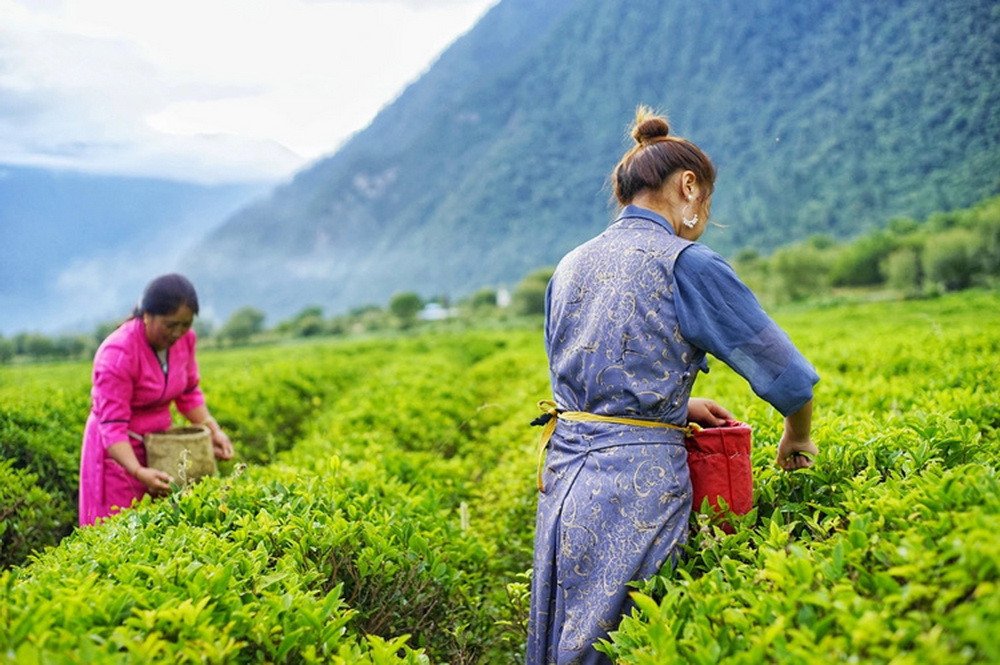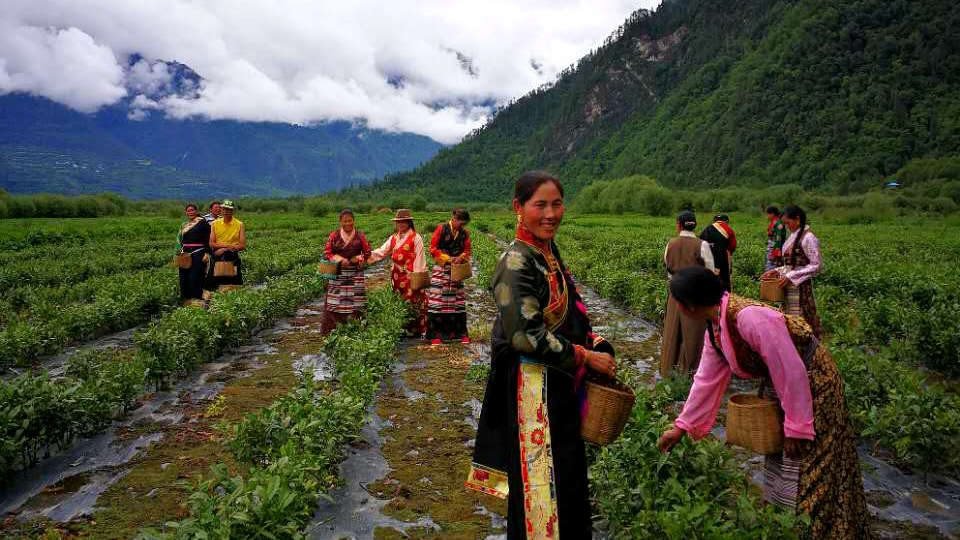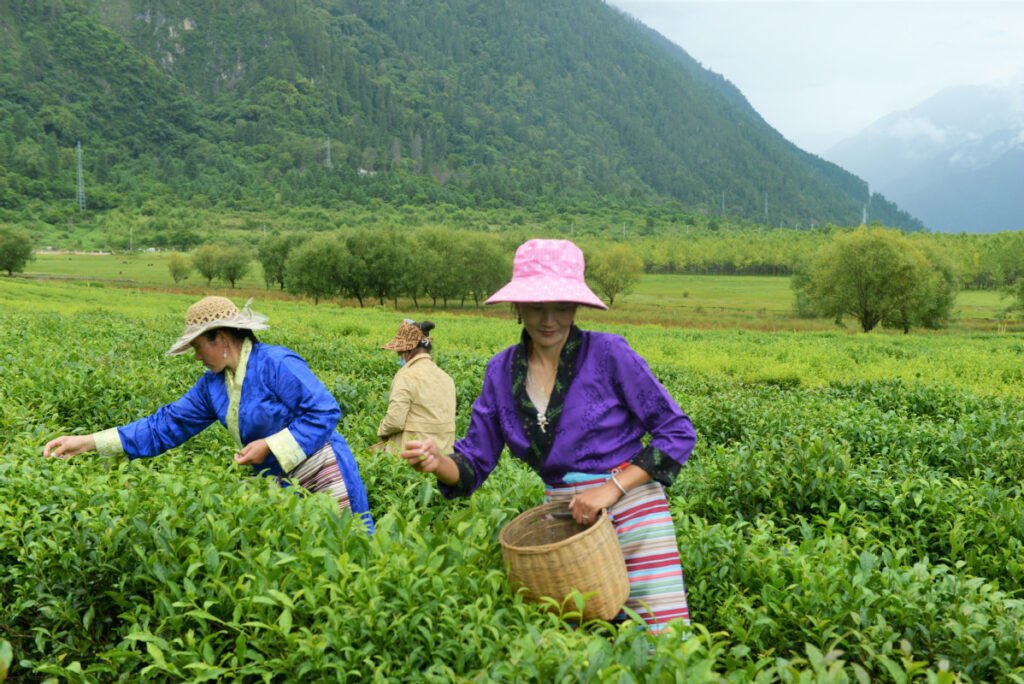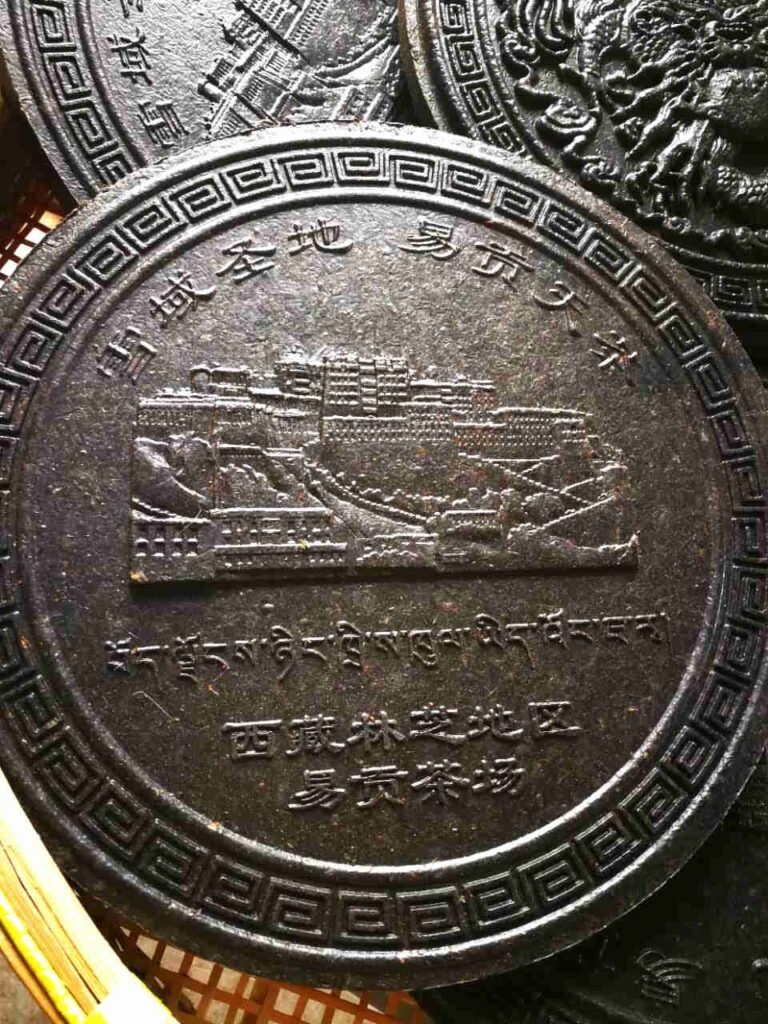Overview of Yigong Tea Plantation
Nestled inside the stunning Yigong National Geological Park in Bomi County, Nyingchi, the Yigong Tea Plantation is widely recognized as the highest tea plantation in the world. Sitting at an altitude of 1,900 to 2,300 meters, this unique tea-growing region benefits from cool temperatures, clean mountain air, and abundant rainfall. With an average annual temperature of 11.4°C and yearly precipitation ranging from 960 to 1,100 mm, the environment is ideal for producing high-quality high-altitude tea in Tibet.
- Tibetan Name: བོད་ལྗོངས་ཉིང་ཁྲི་ས་ཁུལ་ཡིད་འོང་ཇ་ར།
- Chinese Name: 西藏林芝易贡茶场,中国海拔最高的茶场
Surrounded by glaciers, forests, and alpine landscapes, Yigong Tea Plantation ཡིད་འོང་ཇ་ར། offers a rare blend of natural beauty and agricultural innovation, making it an important destination in eastern Tibet.

Historical Background of Yigong Tea Plantation
The history of Yigong Tea Plantation dates back to 1960, when tea cultivation was first introduced to the area. Over the decades, the plantation experienced multiple administrative transitions. In 1998, it became Tibet Sun Agricultural Resources Development Co., Ltd., marking Tibet’s first state-owned agricultural reform enterprise.
Tea production entered a new phase in 2008, with systematic restoration efforts. By 2010, Guangdong Province, led by Foshan City, began providing paired assistance. Continued support from the Guangdong Provincial State-owned Assets Supervision and Administration Commission since 2013 has helped modernize production, improve infrastructure, and enhance product quality, ensuring the long-term development of Tibet’s high-altitude tea industry.

Plantation Scale and Agricultural Resources
Covering a vast area of 96 square kilometers, Yigong Tea Plantation is one of the largest agricultural operations in Nyingchi. The plantation includes:
- 24,000 acres of land, including
- 6,445 acres of arable land
- 2,200 acres of tea gardens, producing
- 15 tons of fine tea annually
- 25 tons of brick tea annually
- 740 acres of orchards
- Over 40,000 acres of pasture and developable agricultural land
This large-scale operation supports both tea production and diversified agricultural development in the region.

Unique Tea Varieties of Yigong
Yigong Tea Plantation is famous for its diverse range of premium Tibetan teas, shaped by high altitude, misty conditions, and traditional craftsmanship.
- Tibetan Red Tea: This tea features tight, straight strands with visible golden fuzz. It offers a fragrant fruity aroma, bright red infusion, refreshing taste, and a coppery leaf base, making it one of the plantation’s signature products.
- Black Tea Cakes: Highly prized for their complex craftsmanship, Black Tea Cakes are produced using 32 traditional techniques. Their refined appearance and rich flavor make them especially popular as gifts and collector’s items.
- Snow Land Silver Peak & Snow Land Tea Ji: Harvested in April and May, these teas undergo a meticulous 8-step production process. They are known for their elegant aroma, smooth texture, and clean, lingering finish.
- Yigong Cloud Mist Tea: Characterized by tightly curled, green, glossy leaves, this tea delivers a rich aroma, refreshing taste, and a clear green soup, reflecting the misty mountain environment where it grows.
- Linzhi Spring Green Tea: A premium green tea variety with a strong natural fragrance, bright infusion, and crisp aftertaste, Linzhi Spring Green Tea is highly favored by tea enthusiasts seeking freshness and purity.

Visiting Yigong Tea Plantation
Reaching Yigong Tea Plantation is part of the adventure. The site is accessible via National Highway 318 and Provincial Road 305, located about 168 kilometers from Bayi Town in Linzhi and 105 kilometers from Bomi County town. Road and visitor facilities in the area continue to improve, making travel increasingly convenient.
Historical and Memorial Sites Nearby
In addition to tea gardens, the plantation area features important historical landmarks.
General’s Tower: This structure once served as a temporary residence for Commander Zhang Guohua during his expedition to Tibet. Now over 50 years old, it has been designated as a county-level cultural heritage site.
Ten Brave Soldiers Monument: Originally located near the eastern end of the Yigong Tongmai Bridge, the monument was destroyed by a flood in 2000. A new memorial was built in 2003 to honor the soldiers’ sacrifice, adding historical depth to the area.
Blending high-altitude tea cultivation, modern agricultural reform, and rich historical heritage, Yigong Tea Plantation stands as a unique symbol of Tibet’s innovation and natural abundance, offering visitors insight into one of the world’s most remarkable tea-growing regions.





